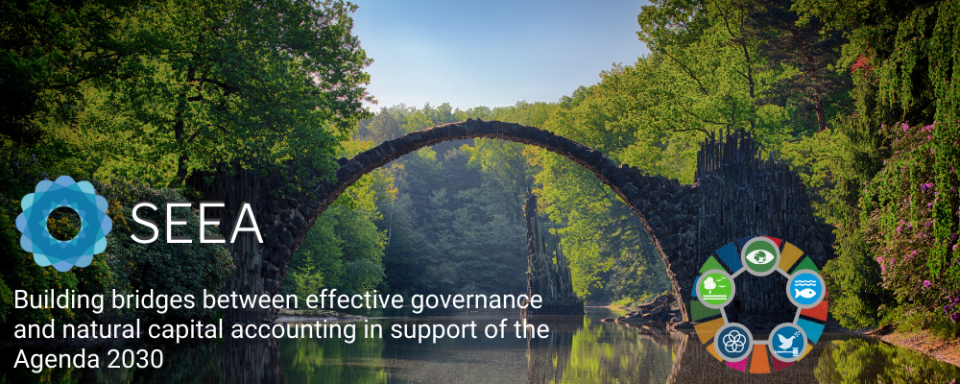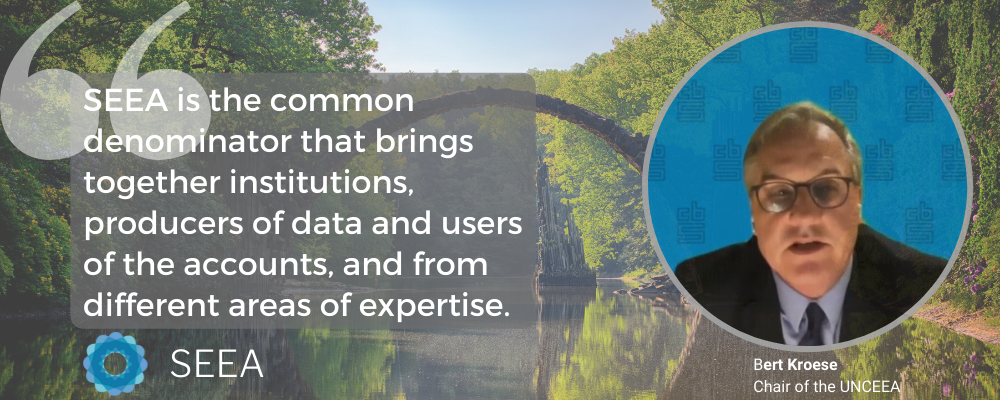Building bridges between effective governance and natural capital accounting in support of Agenda 2030

The progress in achieving the targets of the Sustainable Development Goals (SDGs) to combat climate change (SDG 13), conserve oceans and marine resources (SDG 14) and protect and sustainably use terrestrial ecosystems and halt biodiversity loss (SDG 15) has stagnated, and even deteriorated, across every region of the world. To reverse this trend, major institutional shifts and better ways to account for nature in decision making must be urgently addressed.
These were some of the findings of the discussion paper Institutional challenges and opportunities related to climate change and the protection of natural resources[1] prepared by the United Nations Committee of Experts on Public Administration (CEPA) and the background paper Building strong institutions for addressing climate change and for the sustainable management of natural resources[2], which were the basis of the discussion during the second meeting of the CEPA twenty-first session held on 4 April 2022 in New York.
To make the connection between better institutional governance and natural capital accounting, Mr. Bert Kroese, Chair of the Committee of Experts on Environmental-Economic Accounting (UNCEEA) joined the meeting remotely to present the work of the UNCEEA in developing and mainstreaming the System of Environmental-Economic Accounting (SEEA), in particular the SEEA Ecosystem Accounting (SEEA EA).
Mr. Kroese made the case for the SEEA as a way to overcome institutional challenges such as institutional and governmental fragmentation, lack of policy coherence, and difficulties in measuring climate change and biodiversity. Mr. Kroese pointed out that part of the SEEA’s value is that it brings together different institutions. Compilation of the SEEA requires different expertise and collaboration between various line ministries, with non-governmental institutions, and between producers and users of accounts. Thus, the implementation of the SEEA helps mitigate institutional fragmentation by bridging stakeholders, promoting data sharing and fostering strong coordination. In turn, integrated data on the environment and economy promotes policy coherence.
Mr. Kroese also mentioned the role of the SEEA in providing a basis for rigorous and policy-relevant indicators. The SEEA provides an agreed-upon framework to derive comparable and well-defined indicators for the measurement of progress of some targets of the SDGs, the post-2020 global biodiversity framework, sustainable tourism and the new G20 Data Gaps Initiative. The role of the SEEA EA in making nature more visible in policy making was also discussed. Mr. Kroese stressed the importance of the SEEA EA’s biophysical accounts in making nature more visible, particularly given the spatial nature of the accounts. However, he also discussed the importance of the monetary accounts in ensuring that ecosystems and their services are not valued at zero, while also acknowledging that challenges exist in monetary valuation.

During the meeting, Mauricio Rodas, former major of Quito, Ecuador and member of CEPA, discussed the importance of cities in the mitigation and adaptation of climate change and biodiversity. Cities have become responsible for a large percentage of CO2 emissions, as more people move to urban areas, and natural ecosystems are rapidly converted to urban areas. As such, cities are key to tackling climate change and biodiversity loss. In this respect, the SEEA EA, through its urban ecosystem accounts, can measure changes in the extent, condition, and provision of services by urban ecosystems, and provide important policy insights in how urban areas can help tackle climate change and biodiversity loss. Multiple countries around the world, for example Norway and South Africa, have produced urban ecosystem accounts.
Ms. Linda Bilmes, Senior Lecturer Chair in Public Policy at the Harvard Kennedy School and member of CEPA, stressed that the challenge of institutional fragmentation at national and subnational level, can be mitigated by SEEA implementation. She also underlined the need for good communication and strong collaboration and interaction between producer and user communities. Ms. Bilmes stated: “The SEEA needs to be mainstreamed into policy and into the work governments. For that, it is fundamental to understand how it can be used. CEPA has a role to play in promoting the use of the SEEA in public policy”.
The recording of this meeting can be accessed here.
The Committee of Experts on Public Administration (CEPA) is a subsidiary body responsible for supporting the work of the Economic and Social Council (ECOSOC), an organ of the United Nations, concerning the promotion and development of public administration and governance among Member States notably in relation to the 2030 Agenda for Sustainable Development and in support of the implementation and progress reviews of the Sustainable Development Goals.
The Committee of Experts on Environmental Economic Accounting (UNCEEA) has been mandated by the by the Statistical Commission of the United Nations, a subsidiary body of ECOSOC, to develop, mainstream and advance and the implementation of the System of Environmental Economic Accounting (SEEA).
[1] E/C.16/2022/3
[2] Siddaqi, A. et al. “Building strong institutions for addressing climate change and for the sustainable management of natural resources”. Background paper for the UN Committee of Experts in Public Administration - Working group on institutional challenges and opportunities related to climate change action and protection of natural resources (December 2021). Available at: https://publicadministration.un.org/Portals/1/CEPA21%20-%20background%20paper%20on%20institutions%20for%20climate%20action%2021%20Dec%202021.pdf
